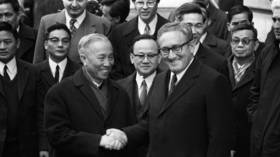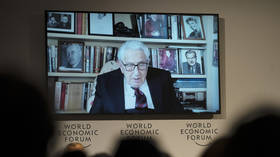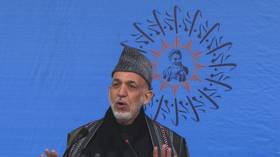50 years after leaving Vietnam, the US keeps getting involved in wars without understanding them

In January 1973, the US signed an agreement that saw it pull out of Vietnam, abandoning its South Vietnamese partners. In August 2021, history repeated itself in Afghanistan.
Vietnam being one of the theaters of the Cold War, the US decided to intervene to face the progression of communists in the country. According to the domino theory, Vietnam needed to stay within the Western sphere of influence. For the sake of democracy all over the world, obviously.
The year 1965 was the beginning of a massive US involvement. Until then, Washington had limited itself to sending supplies and about 900 military observers and trainers. But after the controversial Gulf of Tonkin incident in 1964, the American engagement became way more serious. At its peak in 1969, the US intervention included more than 540,000 troops on the ground. However, the large scale 1965-68 Operation Rolling Thunder, during which the US dropped 864,000 tons of bombs on North Vietnam, ended up a failure. The surprise Tet Offensive launched by the North Vietnamese was also a failure, but it seriously damaged South Vietnam’s infrastructure and the US’ reputation as a trustworthy ally.
By the end of the ‘60s, the US population had grown tired of the conflict, and more and more protests against the war were organized throughout the country. President Richard Nixon had campaigned in 1968 on the promise to end the war in Vietnam with peace and honor – the idea was to gain time and arm the South Vietnamese in order for them to defend their positions on their own. However, Nixon had failed to deliver this peace and, in 1972, was facing re-election. As the Americans had already proved during WWII when they constantly postponed the opening of a second front in Europe, a ‘democratic war’ is always closely linked to elections and internal political fights.
Three (very different) men in a boat
How the talks went is a crucial illustration of how cynical, and sometimes absurd, the foreign policy of the US can be.
Richard Nixon sent in Henry Kissinger, the national security adviser at the time. A brilliant personality, Kissinger (who is now 99) was already a member of the establishment. He did not regard South Vietnam as being important in itself, but considered it necessary to support it in order to maintain the global power status of the US. He was convinced that none of the allies of Washington would trust them anymore if the US were to dump Saigon too quickly. Realpolitik incarnate.
The North Vietnamese envoy for these negotiations was Le Duc Tho, who had started his career as a revolutionary when he was 16 and had been one of the founders of the Indochinese Communist Party in 1930. He had been jailed twice for several years by the French in very harsh conditions. He was dedicated to the unification of his country. Kissinger called him a “fanatic.”
The third man was South Vietnam’s president, Nguyen Van Thieu. He had joined Ho Chi Minh’s Viet Minh but left it after a year of service and went on to join the Vietnamese National Army of the French-backed State of Vietnam. The president of South Vietnam since 1965, he had managed to ensure a relative security but was known for turning a blind eye to (and indulging in) corruption. Another example of American foreign policy, which the quote “He may be a bastard, but he is our bastard” summarizes quite well. To add cynicism to the picture, Nguyen did not actually get a chance to sit at the negotiating table.
The cosmopolitan intellectual, the revolutionary nationalist, and the opportunist politician. Which of them was the good, the bad, or the ugly is a matter of personal preference.
The Vietnam peace treaty: Rehearsal for Afghanistan?
Between 1969 and 1973, Henry Kissinger and Le Duc Tho met more than 15 times in Paris. According to American historian A. J. Langguth, at one point in 1970, when things seemed at a standstill, one of Kissinger’s attempts to talk to Le Duc Tho was met with a note saying: “The US words of peace are just empty ones.” But with the US proposal and the coming presidential election, North Vietnam had a chance it could not pass up. As the subsequent events proved, the Vietnamese understood the Americans, but the Americans did not understand the Vietnamese.
The two sides ended up negotiating a complete withdrawal of the US and the release of all POWs in North Vietnam. However, the negotiations almost collapsed after this agreement, as Nixon wanted amendments and Nguyen Van Thieu, having been excluded from the talks, did not want to sign it. Kissinger managed to gain some cosmetic concessions from the North Vietnamese in order for the US not to lose face. Washington sent an ultimatum to Nguyen Van Thieu. The peace treaty was signed on January 27, 1973 in Paris. However, the ceasefire was broken by both Vietnamese sides within 24 hours. Two years later, on April 30, 1975, Saigon fell to the communist North Vietnam and it marked the definitive and complete withdrawal of the US. Nguyen Van Thieu made a final speech denouncing Washington for not keeping its word and then fled to Taiwan.
Any resemblance with the Afghan scenario is purely coincidental. In 2020, the US and the Taliban signed an agreement for the American withdrawal from Afghanistan. The Afghan government was not invited to negotiate. The ceasefire was broken almost immediately. Two years later, Kabul fell to the Taliban.
Interestingly enough, the propaganda machine still has it that the US did not lose the Vietnam War – South Vietnam lost. Even Wikipedia does not mention that it was a US defeat: The French were defeated, but in the case of the US, it was simply a “withdrawal.”
Lost in translation
In Francis Ford Coppola’s movie ‘Apocalypse Now’, the character Hubert de Marais has this very important line which he delivers with a typical French accent: “The Vietnamese are very intelligent. You never know what they think. The Russian ones who help them – ‘come and give us their money. We are all communists. Chinese give us guns. We are all brothers.’ They hate the Chinese! Maybe they hate the American less than the Russian and the Chinese. I mean, if tomorrow the Vietnamese are communists they will be Vietnamese communists. And this is something you never understood, you Americans.”
Coppola had, in the ‘70’s, understood something that former US Secretary of Defense Robert McNamara only came to understand in the ‘90’s when he met with Vietnamese General Vo Nguyen Giap. With astonishment, he suddenly realized that the Vietnamese were fighting a war of independence, not an ideological war. The 20-year conflict in Vietnam had never been about the spread of communism in the world. Concerning US foreign policy, the elderly and experienced politician went on to say: “We don’t understand the Bosnians, we don’t understand the Chinese, and we don’t really understand the Iranians.” With the exception of colonized Western Europe, it seems to be a good summary of Washington’s policy towards countries all over the world.
But the propaganda machine works well: Kissinger will be remembered as the one who got the Nobel Peace Prize for the 1973 treaty. Le Duc Tho gracefully refused it.
The statements, views and opinions expressed in this column are solely those of the author and do not necessarily represent those of RT.














